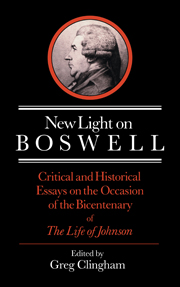 New Light on Boswell
New Light on Boswell Book contents
- Frontmatter
- Contents
- Notes on contributors
- Preface
- Acknowledgements
- Abbreviations
- 1 Introduction: Boswell's ambiguities
- Part I BOSWELL AND EIGHTEENTH-CENTURY SCOTTISH CULTURE
- 2 Boswell and the rhetoric of friendship
- 3 Scottish divines and legal lairds: Boswell's Scots Presbyterian identity
- 4 Boswell and the Scotticism
- 5 Boswell as critic
- Part II CONTEXTS FOR THE LIFE OF JOHNSON
- Part III THE LIFE OF JOHNSON RECONSIDERED
- Index
2 - Boswell and the rhetoric of friendship
Published online by Cambridge University Press: 28 October 2009
- Frontmatter
- Contents
- Notes on contributors
- Preface
- Acknowledgements
- Abbreviations
- 1 Introduction: Boswell's ambiguities
- Part I BOSWELL AND EIGHTEENTH-CENTURY SCOTTISH CULTURE
- 2 Boswell and the rhetoric of friendship
- 3 Scottish divines and legal lairds: Boswell's Scots Presbyterian identity
- 4 Boswell and the Scotticism
- 5 Boswell as critic
- Part II CONTEXTS FOR THE LIFE OF JOHNSON
- Part III THE LIFE OF JOHNSON RECONSIDERED
- Index
Summary
In an important essay Bruce Redford touches on one of the most intriguing aspects of the Boswell problem: “the question of literary alchemy – life into art, art into life, a life in art – and the nature of Boswell's own transformational powers. In the hands of a master, the familiar letter creates an autonomous verbal universe, a true literary system that achieves, both formally and ontologically, the status of poetic reality – at once internally consistent, vital, and self-supporting.” Such mastery entails rhetoric of an essentially literary kind, deployed to foster an illusion of talking, whose effect is to create letters which are at one and the same time counters in an exchange and units in whole correspondences which are romans fleuves. It implies the art of the miniaturist, who cultivates “Jane Austen's one small square of ivory” and takes infinite pains on a limited scale. But for Boswell, life came first; his aim as a writer was to reflect and heighten events which had spontaneously happened in life, or which he had originated or stage-managed in life. This is as true of his letters as of any other part of his œuvre. In this essay I shall not be concerned, in the main, with Boswell's correspondence with heroes and great men, but with his letters to three friends who were more or less his equals and contemporaries – the Hon. Andrew Erskine, John Johnston of Grange, and William Johnson Temple.
- Type
- Chapter
- Information
- New Light on BoswellCritical and Historical Essays on the Occasion of the Bicententary of the 'Life' of Johnson, pp. 11 - 27Publisher: Cambridge University PressPrint publication year: 1991


